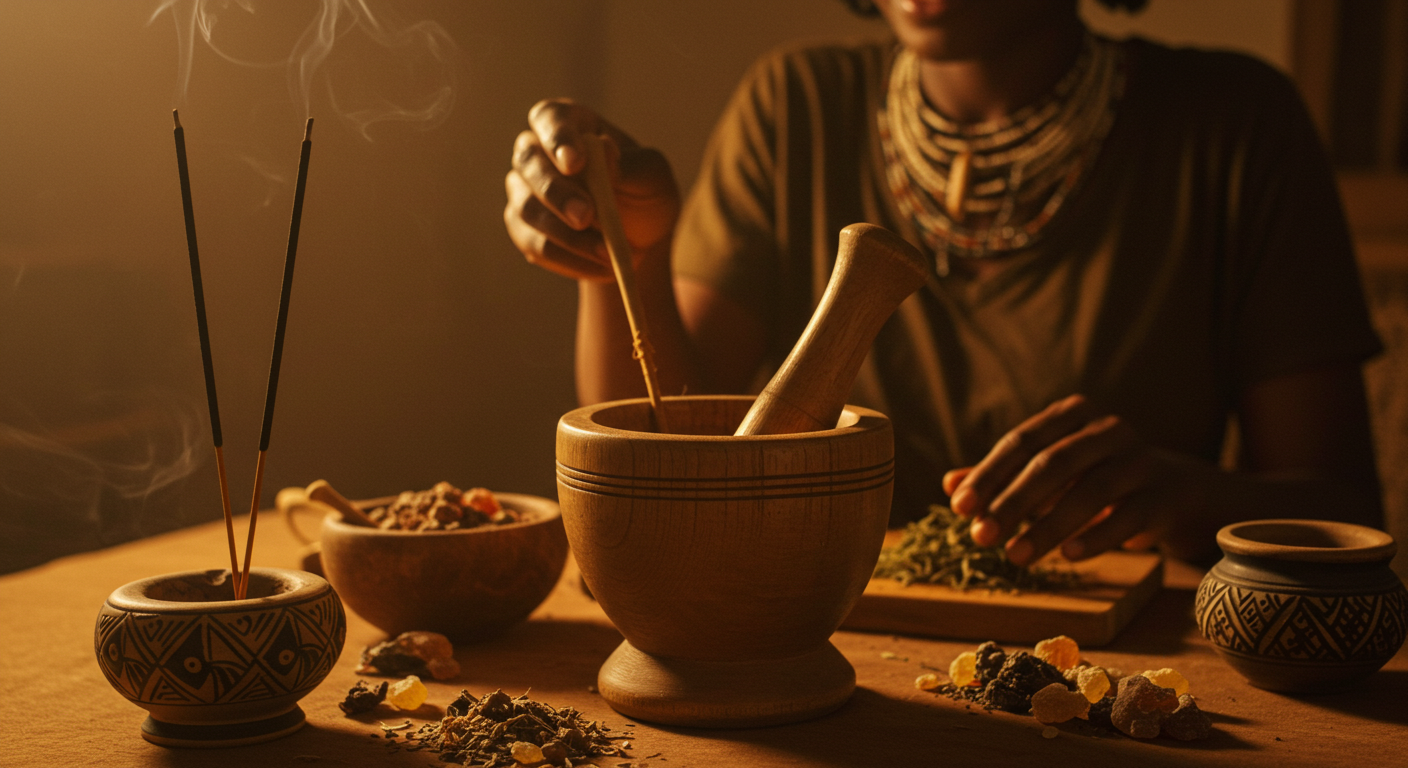Aromas have the unique ability to evoke places, memories, and emotions. For those who’ve walked through a Moroccan souk, visited a Yoruba shrine, or entered a Berber tent, the scent of incense, herbs, and traditional oils is unmistakably African. Scent plays an integral role in daily life and spirituality across African cultures. From cleansing spaces to preparing for rituals or simply enhancing well-being, African olfactory traditions are rooted in centuries of botanical knowledge and spiritual awareness.
The Role of Scent in African Culture
Across the continent, aromas are not only for pleasure—they serve as tools for:
- Spiritual cleansing (e.g., burning frankincense or myrrh)
- Welcoming guests (e.g., spraying rosewater or floral attar)
- Marking milestones (e.g., scented oils at weddings or naming ceremonies)
- Medicinal purposes (e.g., inhaling eucalyptus or camphor leaves for congestion)
The use of scent bridges the physical and the spiritual, making it a vital component of cultural expression.
Popular African Aromatics
- Frankincense (Somalia, Ethiopia): Resin burned for purification and grounding.
- Myrrh (Horn of Africa): Known for its rich, earthy scent used in sacred rituals.
- Shea Butter Oil (West Africa): Infused with herbs and spices, often used as a skin rub and room fragrance.
- Oud (North Africa): Deep, luxurious scent from agarwood, symbolizing wealth and spiritual power.
- African Blue Basil (East Africa): Crushed or boiled to release a sweet, calming aroma.
- Hibiscus, Lemongrass & Rooibos Blends: Common in herbal teas but also infused into oils or simmer pots for scent.
Ways to Infuse Your Home with African Scents
1. Burning Incense and Resins
Use a clay censer or incense holder to burn frankincense, myrrh, or Somali gum. Place in entryways, living rooms, or meditation spaces.
2. Herbal Simmer Pots
Boil lemongrass, basil, cloves, and orange peels in water. Let it simmer to release a gentle, earthy fragrance throughout your home.
3. Essential Oil Diffusers
Blend African oils with carrier oils and diffuse using electric or reed diffusers. Try:
- Shea + sandalwood + vanilla
- Oud + myrrh + cedarwood
- Hibiscus + rose + lavender
4. Scented Sachets and Potpourri
Use dried flowers, herbs, and citrus peels in cloth sachets. Add camphor or eucalyptus for stronger throw. Great for closets, drawers, and car interiors.
5. Traditional African Perfumed Oils
Widely used in Nigerian and Ghanaian markets, oils like Aboniki, Omiero, and perfumed attar can be dabbed onto linen, pillows, or clothing for an ambient scent trail.
Creating Sacred and Soothing Corners
Certain parts of the home can become scent sanctuaries:
- Bedroom: Calming oils like lavender, blue basil, and rose.
- Living Room: Warm scents like clove, cinnamon, and oud.
- Study or Workspace: Uplifting blends like lemongrass, mint, and ginger.
- Bathroom: Eucalyptus and floral waters.
You can also light African beeswax candles infused with plant extracts or herbs.
DIY African-Inspired Scent Recipes
Moroccan Spice Room Spray:
- 1 cup distilled water
- 2 tbsp vodka
- 10 drops cinnamon oil
- 5 drops orange oil
- 5 drops myrrh
West African Shea Infusion:
- Melt raw shea butter
- Add dried hibiscus and crushed cloves
- Let sit 48 hours, strain, and use as scented balm
Ethiopian Frankincense Cone:
- Mix frankincense resin with charcoal powder and honey
- Mold into cone shape and air dry for 48 hours
- Burn slowly on a heat-resistant surface
Conclusion
Scent is memory made manifest, and for lovers of African aesthetics, integrating traditional aromas into your home completes the sensory landscape. Whether through incense, herbs, or oils, creating an aromatic environment rooted in African culture enhances mindfulness, spirituality, and hospitality. Let your home not only look African—but feel and smell like the motherland too.



